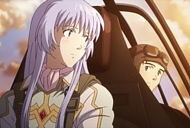
The Princess and the Pilot
Whatever happened to dialogue? I've noticed that a number of recent movies had lines that could have been written by ten-year-olds. I recently watched Before Midnight, and while the cinematography is beautiful, there are no special effects, and there really isn't much of a plot. Most of it is simply two people talking. And yet the film was far more memorable than many others I've seen this summer because the dialogue crackled -- with wit, with love, with anger. In this era, you can dazzle some with special effects and you can get away with a lot if you have a decent plot...but unless you've got some serious eye candy or an unexplored idea to mine, your characters better have something to say.
That's the problem with The Princess and the Pilot. The animation looks great, but it's in the service of a weak story that has only a few brief moments of action. I could forgive it if the leads had some spark or energy or unique qualities. Sadly, they don't. It's clear that the animators were inspired by romantic films of the 1930's and 1940's -- they say as much in the book that comes with NIS America's box set -- but they failed at bringing an Errol Flynn or Carol Lombard to animated life. This makes The Princess and the Pilot a pretty, occasionally entertaining, but ultimately unrewarding watch.
War has engulfed the Levamme Empire and the Amatsukami Imperium. The fighting has gone on far longer than anyone ever expected, delaying the much anticipated marriage of Prince Carlo and Princess Juana. After a devastating attack nearly succeeds at eliminating the princess, it's decided that she'd be safest with her prince in the capital. But how to bring these two together? It all comes down to a secret mission for the country's ace pilot...Charles Karino.
Charles' parents are from both nations involved in the conflict, and as such, he's considered the lowest of the low in society. Officials barely acknowledge him if they don't curse him under their breath, but the mercenary flier is the only hope of reuniting Carlo and Juana. And both of them are taking a huge risk; even equipped with Levamme's fastest plane, if they get caught in an ace's gun sights, they're done for. Juana and Charles couldn't have any more different backgrounds, but they form a deep bond as they fly over oceans and hop between islands desperately trying to stay out of sight of the Amatsukami air fleet.
The Princess and the Pilot is a good-looking film. While TV animation is getting better and better, Princess has a nice, professional sheen we rarely see outside of the theatrical experience. The character designs are easy to watch; the dogfight sequences, while far too infrequent for my taste, excel. The NIS Blu-Ray is lovely, and the art book included in the box set contains a lot more information from the filmmakers than normal -- a real plus in my book. None of the physical details failed to impress.
I don't know if the source material (a light novel) is to blame for the serious problems that The Princess and the Pilot tries to overcome, but they're significant. First, we have the issue of blatant racism against Charles. We're sympathetic to him because everyone but Juana would just as soon shoot him as give him a break, despite his skills. However, the racism is way over-the-top. Further, Charles seems to have no negative effects from lifelong discrimination; he's still a very decent, well-adjusted person with no animosity towards the people or system that despise him. I would be grateful for such an individual in real life. For a movie, however, it would have been more engaging, even realistic, if he had a mercenary disposition rather than a cheerful, happy-go-lucky attitude.
While the class/race system is an issue, the plot itself is another. Sending the princess on a long journey over treacherous waters with little chance of success? Sounds like an intentional setup to me. Yet nothing comes of it. There are no real surprises; it's so straightforward as to be annoying. Even the beats -- the injuries, the missteps, the time spent on an island getting to know each other -- were predictable. There is one place the movie succeeded in surprising me, and I'll keep it a secret for those who plan to see it. But plotwise, deja vu all the way for me.
But the unforgivable issue with The Princess and the Pilot is that the leads weren't worth watching. Juana and Charles just aren't interesting. Ironically, considering the racism angle, I could see a lovable rogue like Clark Gable's Rhett Butler from Gone with the Wind as Charles. Instead, Charles is a milquetoast; giving him more attitude would have least brought some excitement! Juana is a sweetheart, but she's bland too. They aren't annoying to watch, but when I was finished, I was left thinking, "Huh." I hesitate to say it, but both of them fall into the trap of being archetypically Japanese: brave, resourceful, loyally committed, and dull as dirt. I would have given anything for one of them to have been distinct, to stand out in some way, but I didn't get that.
The Princess and the Pilot is a movie caught between worlds. It has action sequences, but it's not an action film. It has romantic concepts, but it's not really a romance. It's dramatic, but it fails to have dialogue equal to a drama. Screenwriter Satoko Okudera commented that they were trying to capture the feel of Roman Holiday, but also stated, "the actual amount of time given to dialogue was extremely limited." Okudera and company captured the understated feel of Roman Holiday, but not the magical interplay between the characters, and that's too bad.
This is not a film where I feel like reviewers who have praised it are completely off-base. I didn't hate watching it; I'd watch it again; I might even feel slightly better about it a second time. But the movie winds up significantly less than the sum of many of its parts...and that makes it feel more of a waste than many films that are really lesser.
The Princess and the Pilot -- mild language, violence -- C+

